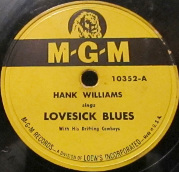Related Research Articles
"Cold, Cold Heart" is a country music and pop song written and first recorded by Hank Williams. This blues ballad is both a classic of honky-tonk and an entry in the Great American Songbook.

"Hey, Good Lookin'" is a 1951 song written and recorded by Hank Williams, and his version was inducted into the Grammy Hall of Fame in 2001. In 2003, CMT voted the Hank Williams version No. 19 on CMT's 100 Greatest Songs of Country Music. Since its original 1951 recording it has been covered by a variety of artists.
"I'll Never Get Out of This World Alive" is a song written by Fred Rose and American country music singer-songwriter Hank Williams, released by Williams in 1952.
"I'm So Lonesome I Could Cry" is a song written and recorded by American country music singer-songwriter Hank Williams in 1949. The song has been covered by a wide range of musicians.

"Lovesick Blues" is a Tin Pan Alley song, composed by Cliff Friend, with lyrics by Irving Mills. It first appeared in the 1922 musical "Oh, Ernest", and was recorded that year by Elsie Clark and Jack Shea. Emmett Miller recorded it in 1925 and 1928, followed by country music singer Rex Griffin in 1939. The recordings by Griffin and Miller inspired Hank Williams to perform the song during his first appearances on the Louisiana Hayride radio show in 1948. Receiving an enthusiastic reception from the audience, Williams decided to record his own version despite initial push back from his producer Fred Rose and his band.

"I Saw the Light" is a country gospel song written by Hank Williams. Williams was inspired to write the song while returning from a concert by a remark his mother made while they were arriving in Montgomery, Alabama. He recorded the song during his first session for MGM Records, and released in September 1948. Williams' version did not enjoy major success during its initial release, but eventually it became one of his most popular songs and the closing number for his live shows. It was soon covered by other acts, and has become a country gospel standard.

"Kaw-Liga" is a country music song written by Hank Williams and Fred Rose.
"Long Gone Lonesome Blues" is a 1950 song by Hank Williams. It was Williams' second number-one single on the Country & Western chart. "Long Gone Lonesome Blues" stayed on the charts for 21 weeks, with five weeks at the top.
"Take These Chains from My Heart" is a song by Hank Williams. It was written by Fred Rose and Hy Heath and was recorded at Williams' final recording session on September 23, 1952, in Nashville. The song has been widely praised; Williams' biographer Colin Escott deems it "perhaps the best song [Rose] ever presented to Hank...It was one of the very few songs that sounded somewhat similar to a Hank Williams song." Williams is backed by Tommy Jackson (fiddle), Don Helms, Chet Atkins, Jack Shook, and Floyd "Lightnin'" Chance (bass). In the wake of Williams' death on New Year's Day, 1953, the song shot to No. 1, his final chart-topping hit for MGM Records. Like "Your Cheatin' Heart," the song's theme of despair, so vividly articulated by Williams' typically impassioned singing, reinforced the image of Hank as a tortured, mythic figure.
"You Win Again" is a 1952 song by Hank Williams. In style, the song is a blues ballad and deals with the singer's despair with his partner. The song has been widely covered, including versions by Ray Charles, Jerry Lee Lewis, Roy Orbison, the Grateful Dead, Charley Pride, Bob Dylan, and the Rolling Stones.
On the Banks of the Old Ponchartrain is a song written by Hank Williams and Ramona Vincent. It was the singer's second single on MGM Records, released in September 1947.
"Calling You" is a hymn written and recorded by Hank Williams.
"A Mansion on the Hill" is a song written by Hank Williams and Fred Rose and originally recorded by Williams on MGM Records. It peaked at No. 12 on the Most Played Jukebox Folk Records chart in March 1949.
There'll Be No Teardrops Tonight is a song written by Hank Williams and released on MGM Records as the B-side to "Mind Your Own Business" in July 1949.
"(Last Night) I Heard You Crying in Your Sleep" is a song written and recorded by Hank Williams on MGM Records. It was released as the B-side of "Move It on Over" in 1947.
"I've Just Told Mama Goodbye" is a song by Hank Williams on MGM Records.
"My Son Calls Another Man Daddy" is a song written by Jewell House and made famous by country star Hank Williams, who released the song in 1950.
"(I Heard That) Lonesome Whistle" is a song written by Hank Williams and Jimmie Davis. It became his fourteenth consecutive Top 10 single in 1951.
"I Could Never Be Ashamed of You" is a song written and recorded by Hank Williams. It was released as the B-side of "I'll Never Get Out of This World Alive" on MGM Records in November 1952.
"No, No, Joe" is a song by Hank Williams. It was written by Fred Rose and takes aim at Soviet leader Joseph Stalin.
References
- ↑ "U.S. Copyright Office Virtual Card Catalog 1946-1954". vcc.copyright.gov. Retrieved 2021-09-09.
- ↑ Escott 2004, p. 22.
- ↑ Escott 2004, p. 60.
- ↑ Escott 2004, p. 329.